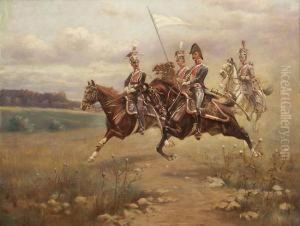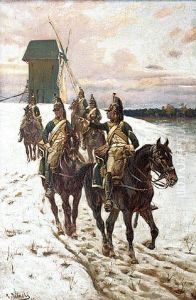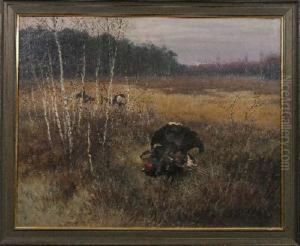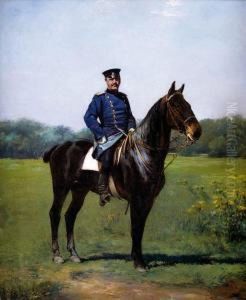Kazimierz Pulaski Paintings
Kazimierz Pulaski, also known as Casimir Pulaski, is not an artist in the traditional sense of a painter or sculptor, but rather a historical figure renowned for his military contributions. Born on March 6, 1745, in Warsaw, Poland, Pulaski was a nobleman and a military commander who is hailed as a hero both in Poland and the United States for his role in fighting for independence in both countries.
Pulaski came from an aristocratic family and was educated in the military arts from an early age. He first made a name for himself in Poland, where he was involved in efforts to resist Russian influence and participated in the Confederation of Bar to defend Polish liberties and the independence of the Polish-Lithuanian Commonwealth against Russian intervention.
After the confederation's defeat, Pulaski fled to France, where he met Benjamin Franklin. Franklin recognized his military potential and recommended him to George Washington. Pulaski emigrated to North America to assist in the fight against British rule during the American Revolutionary War. Known for his brave and impetuous character, Pulaski became known as the 'father of the American cavalry.'
He saved George Washington's life at the Battle of Brandywine and was subsequently promoted to the rank of Brigadier General in the Continental Army. Pulaski was given command of the Pulaski Cavalry Legion, a unit that he trained in European cavalry tactics and is credited with reforming the American cavalry as a whole.
Tragically, Pulaski's career in America was short-lived. He died of wounds suffered at the Siege of Savannah on October 11, 1779. His daring and innovative tactics had a lasting impact on the American cavalry, and his death was a significant loss to the Continental Army.
Kazimierz Pulaski is honored with Pulaski Day in the United States, and numerous memorials, statues, and parades commemorate his legacy. In 2009, he was posthumously granted honorary United States citizenship by Congress, a rare honor bestowed upon only eight individuals in history. Pulaski's memory lives on as a symbol of international solidarity and the fight for freedom and independence.




